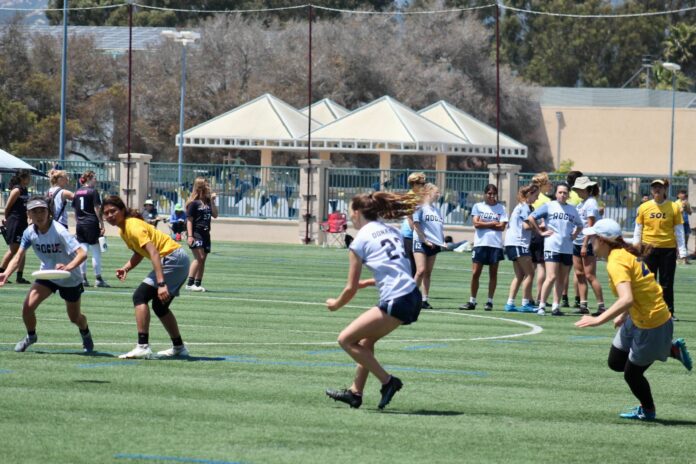An unconventional sports club upholds athleticism, community and sportsmanship
By LYNN CHEN — features@theaggie.org
When discussing sports, basketball, soccer or football might pop into many peoples’ heads first. While not mainstream, ultimate frisbee is still a sport that prides itself on energetic athleticism, a passionate fanbase and steadfast sportsmanship. One such team that demonstrates these values is Rogue, the UC Davis women’s club ultimate frisbee team.
Rogue comprises two teams, A and B, with the main difference being that A is more competitive while B is developmental. Recently, Rogue’s A team competed in the District 1 regionals in Santa Barbara, where the top three teams would qualify for nationals. Rogue did not qualify, but Margo Donahue, a fourth-year psychology and philosophy double major and one of the A-team captains, said that the team “played really well” nonetheless.
The sport itself is a competition involving frisbee with elements from other sports. According to Donahue, ultimate frisbee is “a mix between soccer, basketball and football.” Both teams aim to score by passing the frisbee into end zones. While one team is on offense, the other team plays defense by assigning guards to each person on the offensive team. Players also have to keep in mind rules about passing discs within a certain time frame and keeping in bounds.
What’s special about frisbee is that it’s “self-officiated,” Donahue said. “Players are the ones calling fouls and turnovers, points — everything.”
Emily Denio, one of the A-team captains and second-year environmental policy analysis and planning major, said that it is on players to make sure games are “fair.”
As an ultimate frisbee team, Rogue also requires time commitment from its members. Every week, the A team spends nine hours practicing and one hour doing workout training, while the B team spends six hours practicing. Members also attend regular tournaments.
According to Donahue, workout training for the A team includes running and strength building, as well as exercises focused on defensive and offensive strategies. Denio said that Rogue makes sure to build skills for the two offense positions: handlers, who pass the discs downfield, and cutters, who perform certain running routes to catch the disc. These positions work together to maneuver the disc through the other team’s defense.
Rogue members also often study together and attend social events outside of practice, such as formals, barbecues and “Socks and Mugs” during winter quarter — Rogue’s version of white elephant.
“I would say we are a very close team,” Donahue said. “We definitely do a lot outside of practice to help build chemistry and become closer as a team. A lot of people say that Rogue is like their ‘home away from home.’ We’re a really close community that is super supportive.”
Denio furthered that Rogue facilitates a “welcoming and supportive environment,” especially to newer players.
“We make buddy groups,” Denio said. “Normally, we try to match returning players with rookies or older players with younger players. It’s really cool because younger players can have someone they go to for advice. They can ask them about classes or if they just need help in some other way.”
Karly Thomas, a fifth-year sustainable agriculture and food systems major and captain of the B team, said the club is welcoming to all players of different skill levels and ages.
“I’ve played with 30-year-old postdoc students and 18-year-old freshmen,” Thomas said.
Despite ultimate frisbee’s current niche nature, Donahue and Denio believe that it is an “up-and-coming sport” in the athletic community. Donahue explained that the sport is growing in popularity among college, high school and even middle school communities.
“Very recently, pro-leagues were created,” Donahue said. “The AUDL is the American Ultimate Disc League, which is a professional men’s ultimate league […] while the WUL, Western Ultimate League, and PUL, Premier Ultimate League, are two professional women’s leagues.”
According to Denio, the sport is growing across the globe.
“My first three years of college, I lived with a roommate from China who had been playing ultimate since high school,” Denio said.
Even as ultimate frisbee’s popularity spreads, it occupies a unique space in the athletic world.
“Frisbee is unlike any sport I’ve ever played,” Donahue said. “One aspect of frisbee is called ‘spirit of the game,’ which is the idea that everybody plays with honesty, integrity and respect. I think the frisbee community honors that all over the world. We still are going to play very competitively, and we’re gonna try our best but not at the expense of our dignity and our respect for others.”
Written by: Lynn Chen — features@theaggie.org










